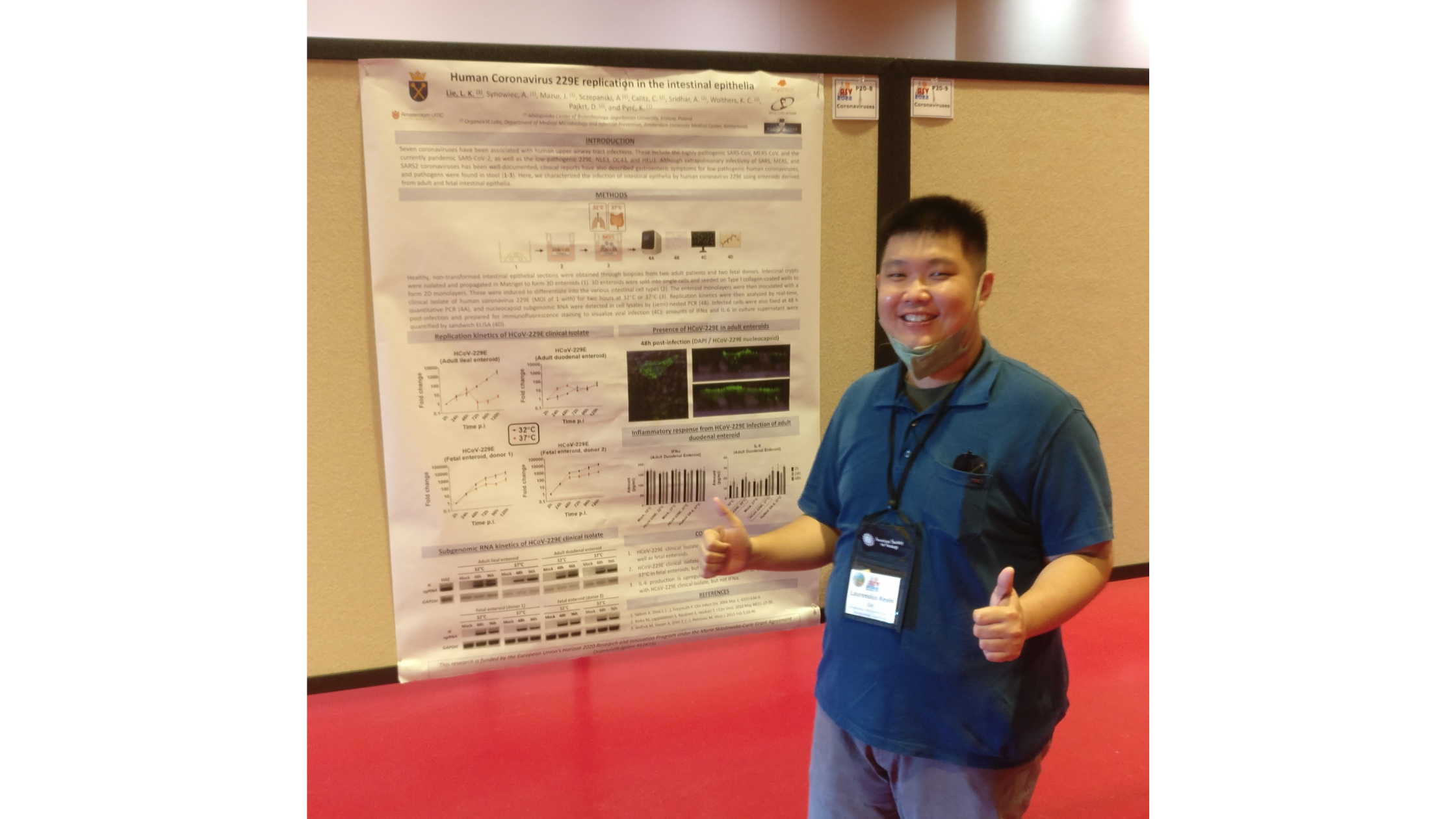
31 Aug ASV 2022 with OrganoVIR ESR Laurensius Kevin Lie
Laurensius Kevin Lie (Kevin) is an Early Stage Researcher (ESR) working at the Jagiellonian University within the OrganoVIR project. Supervised by Professor Krzysztof Pyrć, Kevin is working on the cross-tissue infectivity of coronaviruses with a focus on investigating intestinal infection by seasonal human coronaviruses using human intestinal organoid models. Last month, between the 16th and 20th of July, Kevin presented a poster on his project at the 41stAnnual Meeting of the American Society for Virology (ASV), an event that was hosted by the University of Wisconsin at Madison, USA.
Presenting a Poster at the ASV 2022
Kevin’s poster, titled “Human Coronavirus 229E replication in the intestinal epithelia”, was warmly received by attendees of the conference. “Many of the attendees were fascinated by the intestinal organoid model used to model the coronavirus intestinal infection, and some also offered inputs to further the scope of my research project” he said. For instance, one researcher suggested that he takes a closer look at all the possible ways human seasonal coronavirus can reach the intestinal tissues.
Kevin’s Highlights from ASV 2022
On top of his poster presentation, Kevin also attended a keynote opening lecture by Professor Christine Johnson from the One Health Institute of the University of California-Davis. Professor Johnson’s work focus includes transdisciplinary research to characterize impacts of environmental change on animal and human health and guide public policy at the intersection of emerging disease and environmental health. Her presentation focuses on the approaches to model and predict emerging infectious diseases. In her lecture, Professor Johnson emphasized the importance of including the knowledge and perspectives of local communities in understanding the human-animal interaction in a given area. She believes identifying changes in the local human-wildlife interactions over time is a crucial factor in understanding how novel pathogens can emerge into the human population.
Aside from keynote lectures, Kevin also mentioned several interesting presentations from other researchers on working with organoids as models of infection for various gastrointestinal and respiratory viruses. The presentation that struck Kevin the most was given by Dr. Matthew Gartner from the Peter Doherty Institute in Melbourne, Australia who utilized stem-cell-derived lung and heart organoids to model SARS-CoV-2 infection and investigate the local immune response. In his presentation, Dr. Gartner described the development of lung and heart organoids from stem cells and their application to understand SARS-CoV-2 pathogenicity in these organs. The complexity of the organoid models Dr. Gartner utilized was very fascinating and Kevin was able to briefly discuss this topic with him.
About the ASV
The ASV is a conference that attracts virologists from all over the world. During one of the lunch discussion sessions, Kevin became acquainted with virologists from different corners of the globe who shared their research experiences with him. They highlighted their willingness to be further integrated into the international virology community, as well as the logistical and financial challenges they have been facing.
To conclude, Kevin remarked how attending the ASV annual meeting has been a wonderful and eye-opening experience. “The breadth of topics discussed and the chance to hear various perspectives from other virologists were great personal learning opportunities” he said. He looks forward to establishing further contacts with the researchers that he met during the ASV meeting for potential collaboration on organoid-based virology research.
